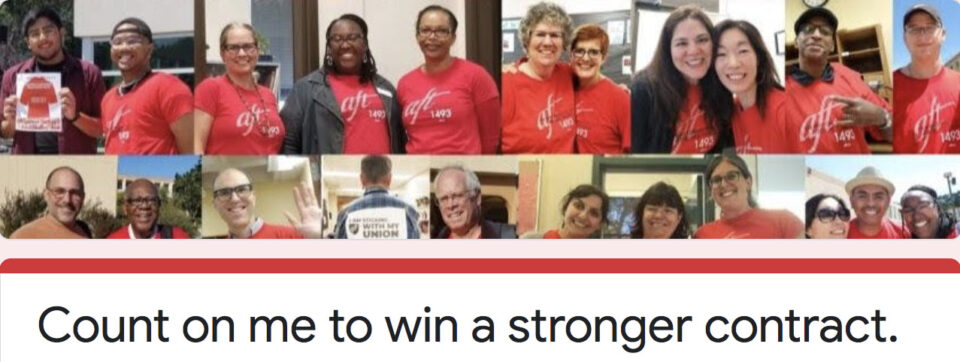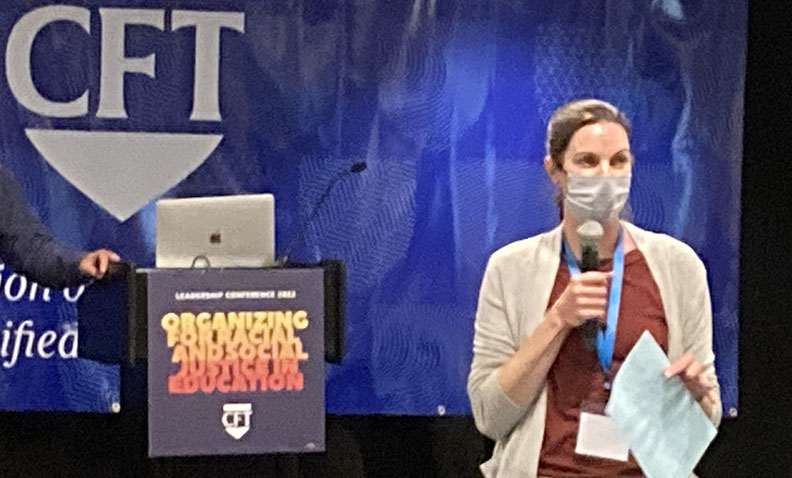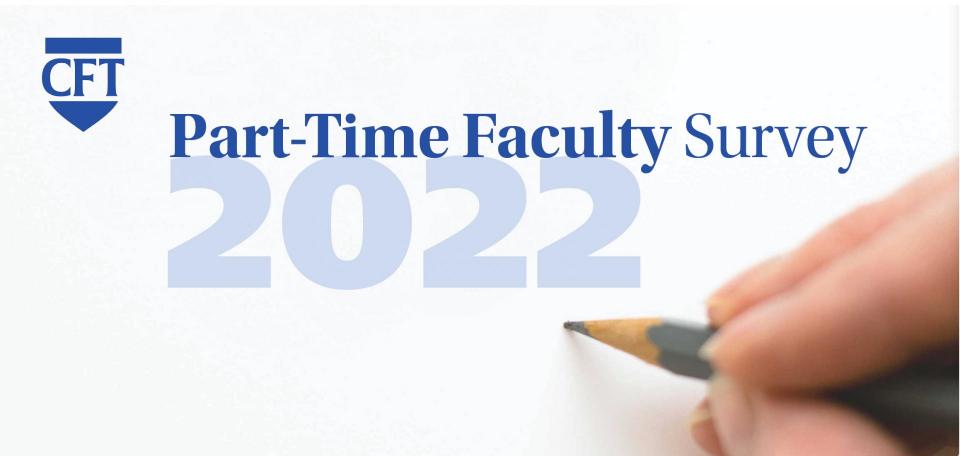Faculty Focus
LaShonda Kennedy, equity champion and community advocate
Interview by Evan Kaiser, AFT 1493 CSM Executive Committee Rep.
LaShonda Kennedy is an adjunct Work Experience Instructor and Spark Point Basic Needs Coordinator at CSM. I talked with LaShonda about community service, her various roles in Workplace Education at CSM, and adjunct faculty rights. Our conversation highlights her involvement with key programs and services, such as Cooperative Education and Spark Point, that extend student learning beyond the classroom.
 LaShonda Kennedy
LaShonda Kennedy
Can you talk a little about your upbringing and path to college?
Both my parents actually went to community college, so for my brother and I, college, in general, was a requirement, not an option. And I wanted to go somewhere a little different than where all my high school buddies were headed – the University of North Carolina at Chapel Hill, which of course is a great place. But I wanted to forge my own path. I had visited Wake Forest University on a minority weekend trip and had such a good time. I had also attended Governor’s School [a program for gifted high school students] for drama in the same town, when I met a recruiter who told me I’d be a good fit and encouraged me to apply even though it was competitive. I loved it so much that I applied the next week on early decision, and I was in by Thanksgiving! So in my journey to college, I was pretty determined to go where I wanted to go.
As you progressed along your career journey, what led you to work at a community college and in Workplace Education more specifically?
I’ve worked at four year colleges throughout my career and enjoyed that work, but I really wanted to do something that was more community-focused.
Outside of work, I spend a lot of time doing community service. We were raised that way – waking up first thing on Thanksgiving morning and giving out food, for instance – so I wanted to get involved in community service as opposed to Stanford, Wake Forest, and even UNC, which are places where not everyone can go, and even when you can get in, you can’t always afford it. So I love this type of institution because it’s for the community.
There’s a perception that four year colleges don’t understand the needs of the community college student, but because I’m a career counselor by trade, I do understand the importance of all levels of education. Eventually, I was able to get a great opportunity at a community college in Iowa and translate that to my work at CSM.
And your current role is Work Experience Instructor, but you have other roles, right?
I was also the Program Services Coordinator for Workforce. A month ago, I took a temporary assignment as Spark Point Basic Needs Coordinator. Outside of work, I’m the President of my Junior League, I’m the chair of the Transportation Advisory Committee in Redwood City, and I participate in the Rotary Club.
What is SparkPoint for folks who don’t know?
It provides basic needs for students, but one of the things it’s most well known for at CSM is financial planning and assistance, helping students create budgets, get their finances on track, and correct credit if that’s needed. Nicole [Salviejo] also helps with tax preparation. And Tom Bauer came up with this great idea, the hunger initiative program, which provides $75 monthly vouchers for students who qualify to help augment their grocery budget. We also have a rapid housing program which provides temporary hotel stays for students who lose their housing.
In your current role, what do you like the most, and what is one thing that you’d change?
What I like the most is the impact. It’s a rollercoaster from day to day, but at the end of that rollercoaster – even if it’s a deep, deep dive – it’s an impact. You’ve helped a student get into a hotel temporarily. You’ve helped a family get groceries who may not have them.
The one thing I would change at SparkPoint, but also across our campus, is the resources. I’m sure you’d say the same thing in your department. And not just the financial ones, but also the people to do the work. Because this work that we do, meeting students 1-on-1, requires people to do that front-end and back-end work.
One program at CSM related to Workforce Education is Cooperative Education. What is that, and can you share any anecdotes about Cooperative Education students?
Cooperative Education is the opportunity for students to earn credit for their work experience. At CSM, vocational work experience requires that the job relate to their major, so the worksite really becomes the classroom as they “learn while they earn.” Students develop three learning objectives with their supervisor, and throughout the semester they actively work on improving them because, at the end of the day, most employers are looking for the same competencies regardless of the industry: teamwork, critical thinking, and on down the list.
A perfect example was a student who happened to take my course three times. The first time, she focused on the technical aspects of the job, but the second time, I pushed her to hone one of those general competencies. So she chose public speaking and worked on it for the whole semester. Then, literally two weeks before the end, a news station showed up to her job and she had to do an interview with the local news! She said she would not have been able to do that had she not been working on public speaking all semester. And it aired on the news – I still have the clip! It’s awesome.
You’re a self-described equity champion and community advocate, so from your vantage point, what does equity look like in our district, and what is an example of equity work that still needs to be done?
I think we’re speaking about equity in the right ways. Now we need to make sure everyone’s on board. You have to bring people along on some of these things. I’m thinking of the whole discourse around Critical Race Theory. You need to help them understand why these things are important. A lot of us say we’re all about equity and want to help our students – and we mean that – yet we look at the surveys and students are telling us that’s not what they’re feeling. This comes up even in staff surveys.
So for us, we just need to put in the work. It’s hard work. We can’t pretend we can just snap our fingers and it’s just going to be there. I’d love to see more of that. And I’ll give you an example of something we did with Accounting. Pre-COVID, in partnership with the County, we organized tours to companies like Google, Facebook, and Amazon for students to see themselves represented there. We wanted to look beyond just the students who sit in the front of the class and volunteer first for everything. We said, let’s come up with an application process, giving students a chance to summarize why they want to go and how it’ll impact their lives. And Steve Heath and others went into some of the learning communities to raise awareness about this opportunity. That all takes work! But if you look at the picture of the students who went on the trip, it’s not what someone would think if you said “this is a group of accounting students who went to Google Cloud Finance.” There were Black students, Southeast Asian students, female students, students of all different backgrounds. This wouldn’t have been the case if we picked the 8 students in the front row who, you know, could have afforded to drive themselves. And so I think people care about equity on our campus – you can hear it in their language – and I want to see it more in the action, the actual hard work and action that you have to do.
Right. We have these equity statements which are pretty transformative, but you can’t just say “justice-y things” and expect anything to happen.
Because students know. You can say whatever you want to say – they know what’s real.
As you were talking, I wrote down “commitment to things like deliberation, iteration, and figuring out logistics.”
That’s right, and it’s hard. And we sometimes don’t want to own that it’s hard. I mean, I’m a person of color and I’m admitting that, even though it’s harder to feel left out, it’s hard to enact equity in the way we need to. But if we say it’s important – if it’s in our mission and all of our statements – then it shouldn’t be something we shy away from.
Turning now to AFT, you’ve been involved more recently with the Contract Action Team (CAT) (and you’re also the Vice President of the Classified Senate). How did you get involved, and why was it important to you to do so?
Well [laughs], I got a call from David Laderman, and I’ve worked with him in other areas like on Curriculum Committee, where I recently presented another volunteer-based work experience course, and he was so supportive. So he called me and explained why it’s important to bring our colleagues along – not that people don’t care, just that they don’t hear enough about why their voices need to be heard. I’m a big proponent of representation, and sometimes the loudest voices get the most representation, but they don’t always represent everybody’s interests. I wasn’t sure I had the time, but then I thought I might have a different voice, or be able to share voices that don’t often get amplified. Especially for adjunct faculty!
Speaking of adjuncts, what are 1-2 contract priorities that you think would improve working conditions for adjuncts?
I think pay is #1. It’s hard for me to even think #2, #3, or #4. My pay as an adjunct is even more peculiar – I get paid per student, so depending on the number of students I have, that gets me up to 1 unit or 2 units or 3 units. I love this work, so this doesn’t bother me, but I have a full time job, so I’m not complaining. I can’t imagine piecing together just adjunct work. Whether you have 3 classes or 5, the amount of work that you have to put in to engage with students is a lot. Adjuncts should be properly compensated for the investment that they make, which in turn might free up time for them to engage more on campus. But right now, when you’re asking folks to do extra things, they can’t – they need to spend all that time commuting between campuses or preparing lessons or grading.
In talking to some adjunct colleagues, I’m not sure they feel they have a voice inside their own departments and divisions. That’s a problem. Everyone’s voice is valuable, but sometimes they’re treated as a “second voice” or an afterthought.
To wrap up, give us a glimpse into your life outside of work. What do you like to do in your free time?
My husband and I love to travel, so we’re going to St. Kitts and Nevis this summer (for the last few years we’ve felt a little stuck, so we’re super excited to travel internationally again). We also like to wine taste and still have a wine club membership, so if we ever have an AFT party, I can donate some! We like to test out great restaurants in the area since we live in a place where a lot of those folks reside. And we have a bulldog, just like our mascot! So we spend a lot of time with her, too. If there’s any upside of COVID, it’s that we traveled more locally, and we got to bring her along.




